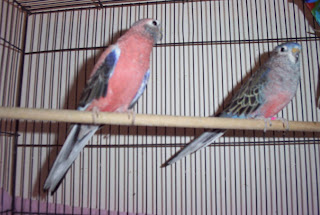 |
| A Rosy & a Normal Bourke. Both are males. |
Kim writes that she recently adopted three Bourkes, a Rosy and two Normals. The Rosy was supposed to be male, but has laid four eggs. Kim threw out the first three, but now the hen is sitting on the fourth egg. She’s concerned for its health and isn’t interested in raising more birds. She had several questions, addressed below.
I feel sorry for your little hen if she's trying to sit on an egg on the floor of her cage... She must be desperate to raise something. Is one of the other birds feeding her? Males feed females they consider their mate, even if they don't breed. Typically it’s a nest box that triggers egg laying, but I had one hen that used a seed cup. I quickly gave her a nest box and she moved into it. If one of your other birds isn't feeding her, you may only have three hens. Or, perhaps the other two consider themselves to be mated and she's the 3rd bird out... It should be apparent that you have a pair if one is feeding another. Bachelor males will sometimes try to feed another male, but hens don’t normally feed one another.
Since you've searched and been unable to find Bourkes in the past, you might consider allowing these to breed and offer the youngsters to a local pet shop. There might be others who'd like to have them and it would generate some income for you, which would help cover the expense of the birds. You say you’re concerned that they might be related. Although it's preferable not to allow birds to mate with a parent or sibling, it's not as disagreeable as it is for mammals. It's a risk worth taking if you want to.
Be sure your birds have cuttlebone and mineral block to insure they get enough calcium. If she's laying eggs, she needs it more than ever. Oyster shell and grit are good too. She might continue to lay a number of eggs if you keep removing them. By allowing her to sit on the fourth egg, she will probably not lay more right away. That's better for her (unless you decide to offer a nest box and let her raise a family).
To discourage egg laying, provide less light. As we move into fall and winter, keep them in a room where the lights go off as the sun goes down. Farmers stimulate their laying hens to keep producing eggs by extending their day length with artificial lighting. Leaving the lights on in the evening will similarly affect your Bourkes. You asked about removing a male, and I wouldn't recommend it for preventing egg laying...it's not likely to have that effect and will leave one of your three birds very lonely.
Sexing your Normals should be an easy thing. As I've mentioned in previous posts, Normal males have a tiny row of blue feathers over their cere (nostrils)...females don't. A very young male will develop it around 6 months of age or so. A male’s pink chest and the blue on his shoulders also tend to be brighter than a female's. It’s hard to recognize, however, except when you have them together and compare them.
Good Luck! I hope you have a male ... their songs & wolf whistles are lovely. Enjoy your sweet birds.


No comments:
Post a Comment